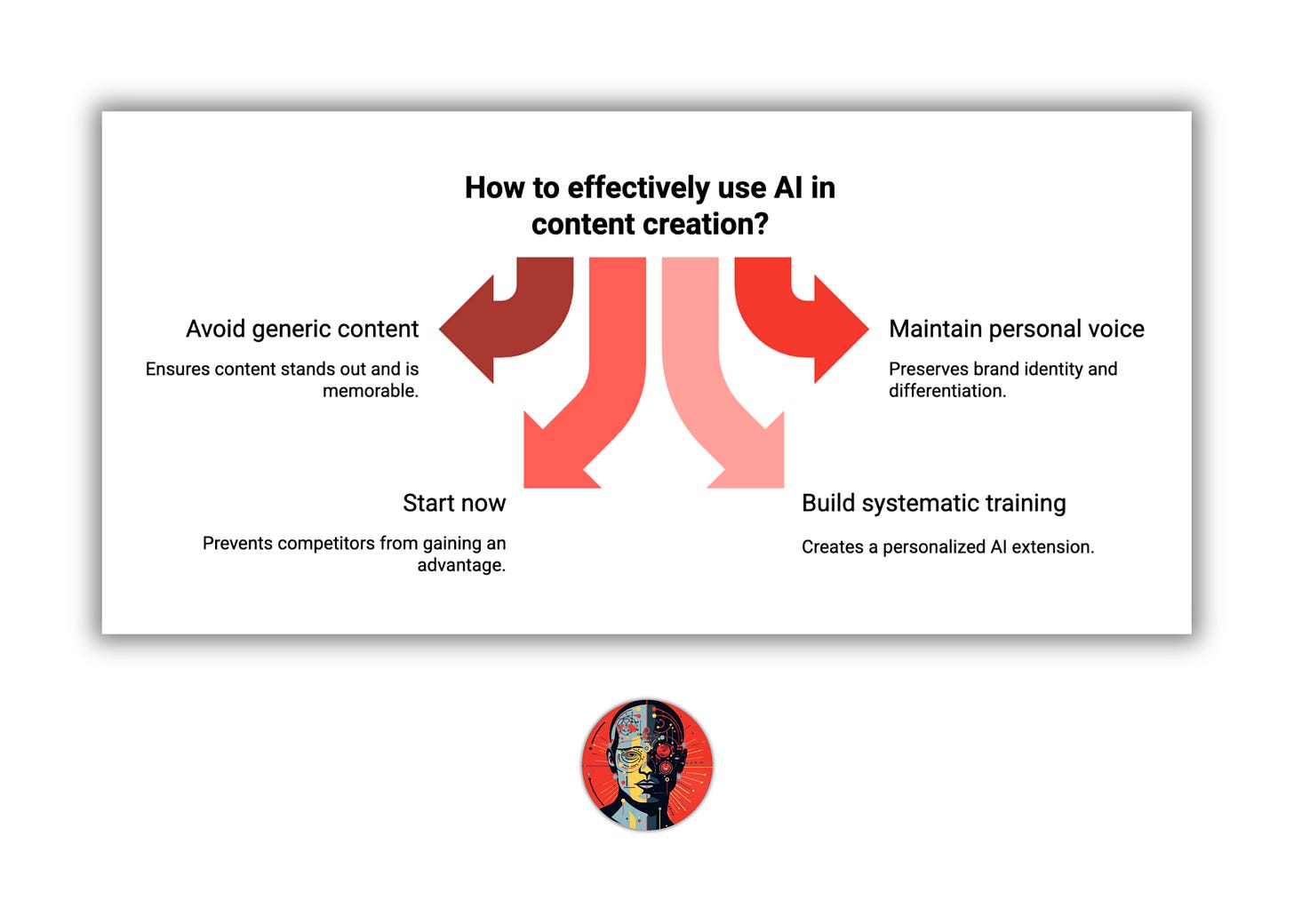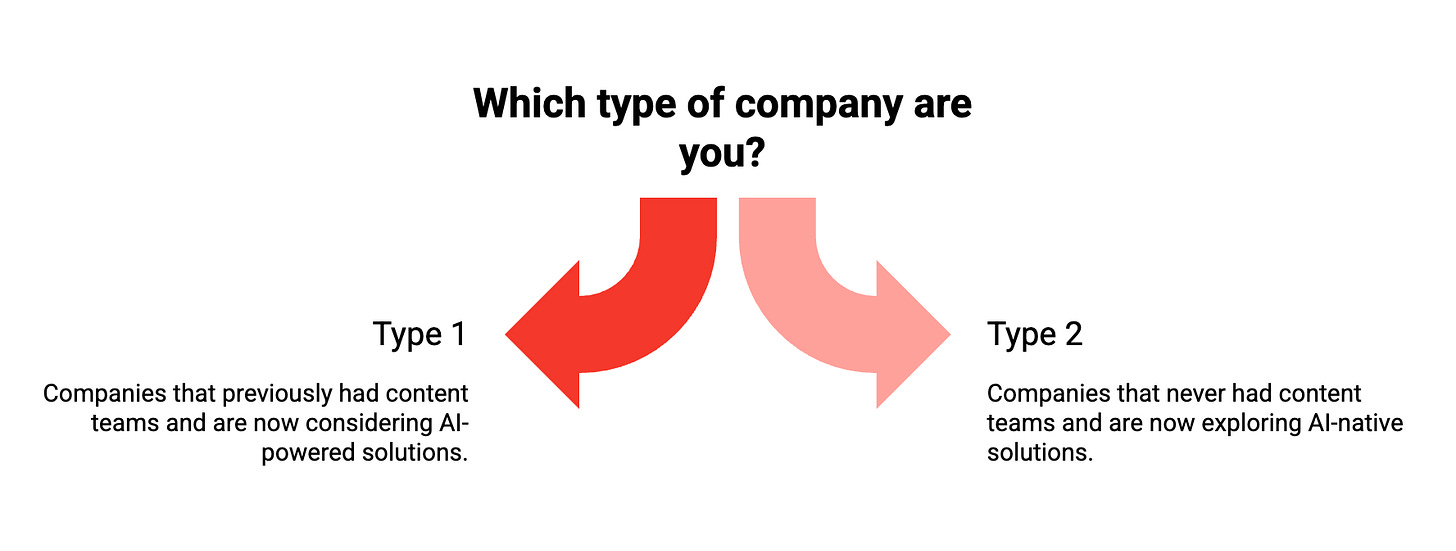Every executive needs to be a content creator by 2026 (or become invisible)
The hidden cost of staying silent while your competitors scale their voice with AI
By 2026, executives who don't create content will be as outdated as those who refused to use email in 1995.
I'm not talking about posting motivational quotes on LinkedIn. I'm talking about systematically scaling your voice, your expertise, and your perspective across every platform where your customers, investors, and talent hang out.
The executives who get this are already building their systems. The ones who don't? They're about to become invisible.
The shift no one's talking about
Companies are completely rethinking how content works.
Some are firing entire content teams and hiring one AI-powered person instead. Others—startups and growing companies that never had the resources for a content team—suddenly realize they can have enterprise-level content capabilities with just one person who knows AI systems.
I know because I'm that person.
I've been brought in as the sole AI content lead after companies downsized. But I've also been hired by CEOs who choose one AI ghostwriter over traditional content teams because they want exceptional results and concentrated expertise.
That's the shift.
Whether you're a Fortune 500 replacing a department or a startup that couldn't afford writers before, the equation has completely changed.
Thought leadership isn't a "nice to have" anymore. It's how deals get done. It's how talent decides where to work. It's how investors separate signal from noise.
The executives who dominate their industries in 2026 won't be the ones with the biggest content teams. They'll be the ones who learned to scale their own voice—either by building the system themselves or hiring someone who already knows how.
Companies are replacing entire content teams with one AI content lead
Six years ago, I began as an AI journalist writing about AI and robotics.
Today? I ghostwrite for AI CEOs and founders. I run content for startups. I grow this community here at AI Disruptor.
And what I learned was that there were always two types of potential companies/clients:
Type 1: Companies that let go of their content teams and wanted to hire one AI-powered individual.
Type 2: Companies that never took the step toward agencies and content teams but now realize one AI-native person could give them everything they needed.
One person with the right AI systems now does in some cases what used to take 5+ people:
Ghostwriting executive content that actually sounds like the executive
Creating all company newsletters
Writing marketing materials that convert
Building SEO content that ranks in AI-powered search engines
Developing thought leadership across every platform
How is this possible? Because systematic AI approaches multiply one person's output by 10x minimum.
I'm not using ChatGPT to write generic blog posts. I'm building complete writing systems that understand voice, strategy, and outcomes. Systems that work as extensions of the leaders or brands they represent.
The companies that understand this are already making the shift. Whether they're optimizing for excellence by replacing bloated teams or strategically investing in AI-powered content leadership for the first time.
Why hiding behind your team won't work anymore
"But I have people for that."
That's what every executive says. Right before they realize their competitors are showing up everywhere while they're nowhere.
The trust equation has fundamentally changed. People don't follow companies. They follow people.
Your customers want to hear from YOU, not your corporate blog. Your future employees want to know what YOU think, not what your PR team approved. Your investors want to see YOUR vision, not sanitized corporate speak.
While you're hiding behind your team—or worse, hiding behind the excuse that you can't afford a team—here's what your competitors are doing:
Building systematic content engines that scale their voice
Showing up in every conversation that matters
Creating competitive moats through thought leadership
The cost of staying silent is expensive today. Lost deals to executives and brands who are more visible. Lost talent to leaders who share their thinking. Lost market position to competitors who own the narrative.
Your AI writing system is all about leverage
Most executives think AI writing is about automating content.
It's not. It's about building an extension of yourself that can think, write, and scale with you.
The system has three pillars:
Build knowledge - Teaching AI your voice, your frameworks, your unique perspective
Co-write with AI - Not outsourcing, but collaborating to maintain authenticity
Scale the output - Turning one idea into 10+ assets across every platform
When your AI system knows your voice, your stories, your way of thinking—that's when everything changes. You stop creating content and start scaling influence.
What executives get wrong about AI content (and what to do instead)
Mistake 1: Trying to sound like everyone else → Every executive using basic ChatGPT prompts sounds identical. Generic. Forgettable. If your content could have been written by any CEO, it's worthless.
Mistake 2: Outsourcing their voice completely → Handing your voice to someone else—AI or human—without a system guarantees you'll sound like a template. Your voice is your differentiator. Don't lose it.
Mistake 3: Waiting for the "perfect" time to start → There's no perfect time. While you're waiting, your competitors are building systems, testing approaches, and owning conversations. The perfect time was yesterday. The second best time is now.
The right approach → Build systematic voice training from day one. Create knowledge bases. Document your thinking. Train your AI to be an extension of yourself, not a replacement.
You have two choices right now
…and only one makes sense.
Option 1: Learn to build your own AI writing system
If you've got the time and inclination, build it yourself. It requires systematic thinking and consistent effort.
Option 2: Hire someone who already knows how to build these systems
This is what smart executives are doing—whether they're Fortune 500s replacing teams or startups getting content capabilities for the first time.
Whoever you hire for content MUST be AI-native.
Stop hiring people who are afraid of AI. Stop hiring "traditional" content marketers who think AI is the enemy. Stop building teams like it's 2019.
Hire people who see AI as an extension of themselves. Who build systems, not just content. Who can do the work of an entire team because they understand leverage.
The real question isn't whether you need this capability. It's whether you can afford not to have it.
The window is closing faster than you think
Why 2026? Because that's when early adopters become the establishment.
Right now, we're in the sweet spot. AI writing systems are powerful enough to create real leverage but new enough that most executives haven't caught on.
By 2026, many more will have an AI writing system. The ones who start now will have years of compound advantage. The ones who wait will be playing catch-up.
Here's what compound advantage looks like:
Your ideas reaching 10x more people
Your voice becoming important in your industry
Your expertise accessible 24/7 across every platform
Your influence growing while you sleep
Your expertise trapped in your head helps no one. Your vision filtered through corporate communications inspires nobody.
The world is moving toward radical transparency and authentic leadership. Those who thrive will be the ones who learned to scale themselves.
You don't need to become a "content creator" in the Instagram sense. You need to become a scaled version of yourself. The authentic leader who shows up everywhere that matters.
The choice is simple: start building your system today, or explain in 2026 why your competitors—including the ones who couldn't afford content teams before—own every important conversation in your industry.
—Alex
Founder of AI Disruptor





